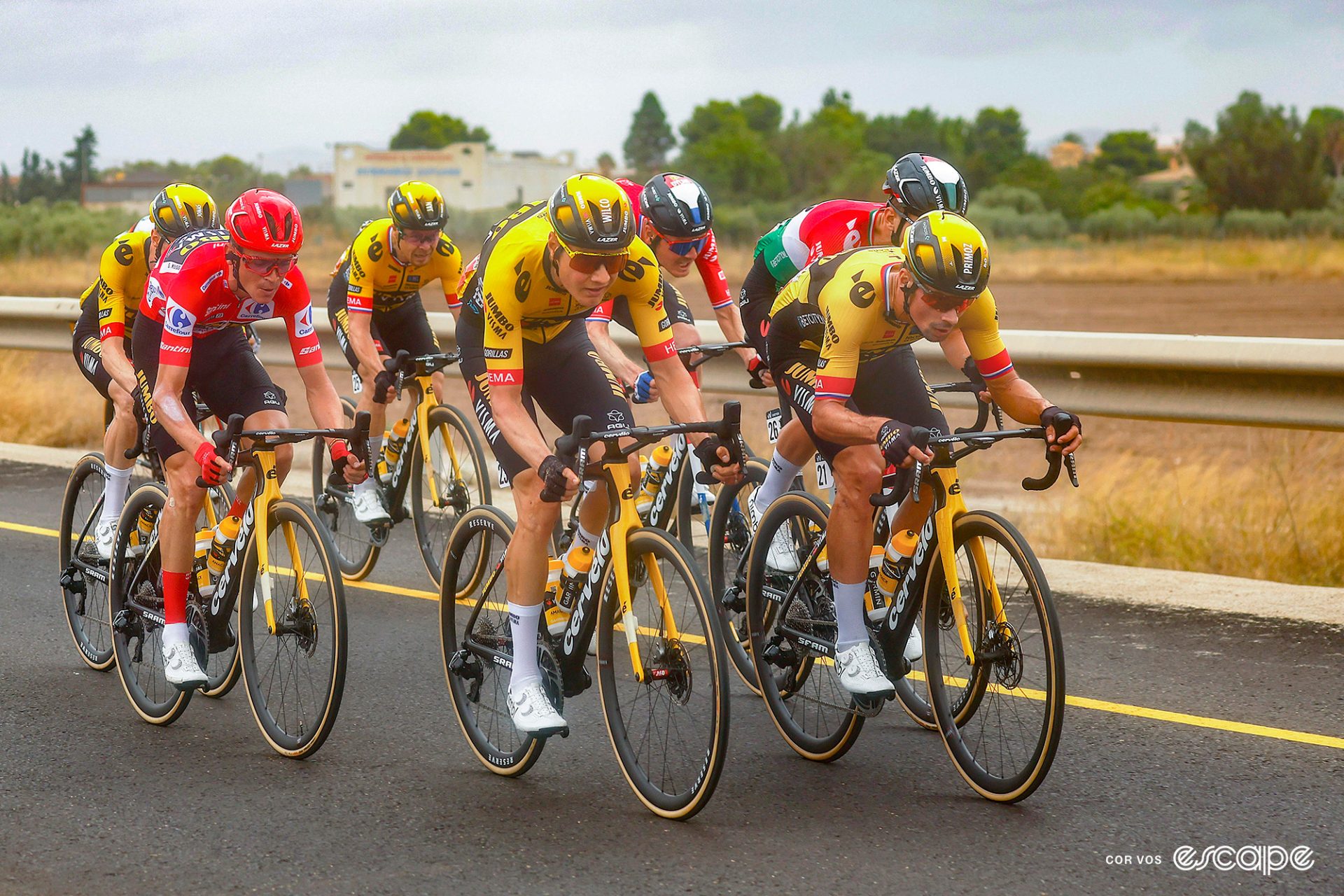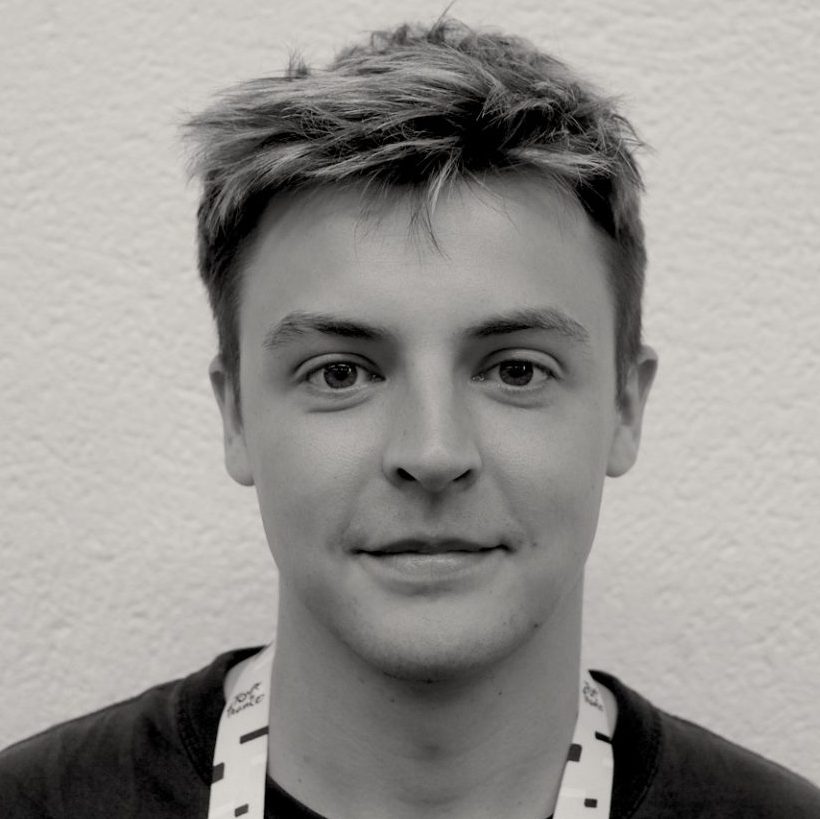Sepp Kuss (Jumbo-Visma) is still in the race lead of the Vuelta a España following the stage 10 time trial. He gave up a probably-less-than-expected 1:13 to Remco Evenepoel, the top-placed GC rider in the 25.8 km race against the clock, and Kuss leads the Soudal-QuickStep rider by 1:09.
All that’s left are 11 stages of mostly uphill kilometres (it is the Vuelta, after all) to test the American’s resolve on the red jersey. The big question that has grown louder every day so far since he took the top spot overall is can Kuss actually do it? Can he hold off Evenepoel, or even his own Jumbo-Visma teammate Primož Roglič? In so doing, he would secure his team’s third Grand Tour win of the season, with an unexpected third different rider.
To deliberate, Dane Cash gives the argument for ‘Yes We Can’, while I provide a dampener to the currently-brewing bonhomie American dream that my colleagues hope will play out over the next couple of weeks.
‘The biggest obstacle to his victory is out of the way now’ – Dane Cash
Let’s start with the current race situation to set the scene, because it favors Kuss.
With 11 stages to go, Kuss has a 29-second GC lead on Marc Soler, and more than a minute on Remco Evenepoel. The bookmakers’ favorite, Primož Roglič, is 1:36 back. Crucially, he’s also Kuss’s teammate.
From here on out, there are no more of those pesky time trials to hurt Kuss’s chances. In other words, Kuss is the one in pole position. He does not need to attack anyone. He just needs to hold on.
It is true that Kuss has never been in this spot before, leading a Grand Tour and possibly trying to win it this far into the race. But Kuss is no rookie. He’s an experienced racer, and he’s not going to be surprised or overwhelmed by the challenges of staying strong into the third week, something he has done to help support his teammates multiple times before. Even as a domestique, he has generally been on-point deep into Grand Tours in his career.
It’s also true that Kuss has already raced two full Grand Tours this season. Yes, he may be tired – but this is the Vuelta. Everyone is tired at the end of the season. Evenepoel may not have two Grand Tours already in the legs, but it’s not like he’s fresh as a daisy in September. The “freshness gap” could be smaller than it might be for, say, a rider who raced the Giro trying to win the Tour de France against those who didn’t.
With those things in mind, it doesn’t seem especially likely that Kuss will have some kind of epic collapse heading into the second half of the race that will drop him down the standings, meaning that his rivals will have to take it to him if they want to overhaul him.

The biggest challengers here are probably Evenepoel and Roglič, but can Evenepoel actually claw back a minute on Kuss and the absurdly powerful Jumbo squad? If Evenepoel tries to attack at any point, Kuss may even have Tour de France champ Jonas Vingegaard helping chase him down; if Evenepoel doesn’t attack, he may have to respond to probing surges from Vingegaard and Roglič all on his own, because it’s not like his Soudal-QuickStep team has the firepower to support him in the mountains.
Those mountains, by the way, are where Kuss shines brightest of all. The biggest obstacle to his victory was the TT, and with that out of the way now, Kuss still has a nice GC lead. From here on out, it’s onto steep gradients, some of them at altitude, and it is on that terrain that we have seen Kuss thriving time and time again so far in his career.
We’ve seen Roglič shine on that terrain too, of course, especially in the Vuelta, and thus the Jumbo team dynamics could be the deciding factor here. The way I see it, Jumbo’s two Grand Tour winners are going to back Kuss as the main leader here for as long as he seems like a viable red jersey. Roglič and Vingegaard aren’t going to intentionally drop a guy who has been so loyal to them in the past. That buy-in to the Kuss cause will be crucial.
With their support, Kuss’s raw talent, and his many years of experience as a super-domestique, the 28-year-old American really can win this bike race.
‘I’m sorry I don’t believe in miracles’ – Jonny Long
You should have seen the eyes of my American colleagues light up when the chatter of our weekly meeting turned to Sepp Kuss and the Vuelta a España. He had just crossed the line of the stage 10 time trial and kept the red jersey on his back and still held more than a minute’s advantage over Remco Evenepoel.
It’s not just Dane and our editor-in-chief Caley Fretz, though. Even the Wall Street Journal’s Jason Gay (colleague of Tour Daily podcast favourite Joshua Robinson of the WSJ) found space slap bang in the middle of his NFL season preview, you know, one of the Big Important Sports that has the national anthem and corn dogs or whatever, to ask the question of whether Kuss could win what would be only the second Grand Tour for an American rider this century.
Sure, he could do it. I can envisage a world where Sepp Kuss doesn’t lose any time over the next two weeks and pulls off a Geraint Thomas 2018 Tour de France cinderella story where the sort-of-lowly helper finally gets their day in the sun and holds an advantage of just over a minute all the way to the finish. It’s the cycling equivalent of the American dream and I’m all here for it.
But I’m sorry, I don’t believe in miracles. Remco Evenepoel is going around calling his teammates “little wankers” mid-stage (in jest, of course) and then backing it up with impressive TT performances, so it’s safe to say he is feeling absolutely fantastic, while Primož Roglič has been doing his ominous lurking, small accelerations to prove he can force a gap and Roglification sprints to show he’s not come to lie down and play second fiddle to anyone else, especially Vingegaard, as the Dane rides on the satisfied fumes of his Tour de France title defence.
You don’t get to be as successful as any of those three riders by being a nice guy and handing out victories to those who deserve it. In 2018, Chris Froome didn’t ride for Thomas simply in lieu of his own suddenly-evaporated ambition, it was because Thomas could ride the legs off of him that July.

Evenepoel gives the impression of being about as outwardly motivated as a professional athlete could be. He talks a big game and continues to back it up in droves. Roglič, meanwhile, aside from his increasingly Big Lebowski-esque persona off the bike, has and always will be a killer on it. There is no chance, unless he falls out of the GC game completely, that he will pack it all in as he did in 2021 for Vingegaard and race for the ambition of the team.
And then you have Vingegaard, only 2:22 behind Kuss currently, and therefore about a minute behind Evenepoel and Roglič. Considering he put untold minutes into Tadej Pogačar at the Tour and still has enough form to be in contention at the halfway point, the Dane will be a threat until the last.
The fireworks will erupt (this is racing in 2023) like America is having a week’s worth of consecutive Independence Days over the remainder of the Vuelta, and until Madrid there will only be the simple question of whether Kuss can hang on to the others – the three best GC riders in the peloton – on the sort of terrain where gaps are usually minutes, not seconds.
Kuss has previously acknowledged his propensity for a bad day in a Grand Tour, and is why he prefers the role of illustrious super-domestique rather than pressure-cooker out-and-out leader. As we edge closer to the best chance Kuss will likely ever get at his own personal Grand Tour glory, we will see him test the boundaries of his self-admitted limits.
It feels like we’re maybe about to enter a condensed American version of the annual l’Hexagone psychodrama where every June the French convince themselves that Thibaut Pinot is the guy for the Tour. Like Pinot, Kuss is an obvious fan favourite. He’s dogged in the face of adversity, always smiling when you seen him in post-race interviews, even in the aftermath of getting his head kicked in on a punishing climb, and he sips big bottles. What’s not to like?
But just because you want something to be true, because you want to believe it into existence, it doesn’t make it real. Sorry America, Father Christmas Santa Claus doesn’t exist.
Did we do a good job with this story?

